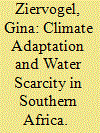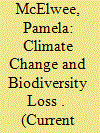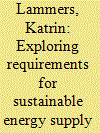| Srl | Item |
| 1 |
ID:
159447


|
|
|
|
|
| Summary/Abstract |
“Adaptation is only going to get more challenging as changes in the climate intensify, combining with the effects of rapid urbanization and the persistently high levels of poverty and inequality in Africa.” Eighth in a series on climate adaptation around the world.
|
|
|
|
|
|
|
|
|
|
|
|
|
|
|
|
| 2 |
ID:
181525


|
|
|
|
|
| Summary/Abstract |
While often treated separately, biodiversity loss and climate change are related and mutually reinforcing problems. Rising temperatures and other climate impacts have seriously altered the composition, function, and structure of many ecosystems and species, some irreversibly. Policies to tackle both problems are clearly needed, but siloed approaches continue to dominate proposed solutions. There are also risks that some climate policies, such as the expansion of afforestation or bioenergy, will have increasingly negative risks on biodiversity. Integrated, innovative, and urgent solutions are needed in order to fulfill increasing calls for transformative change in how we live with nature.
|
|
|
|
|
|
|
|
|
|
|
|
|
|
|
|
| 3 |
ID:
175241


|
|
|
|
|
| Summary/Abstract |
Southeast Asia is one of the regions most affected by impacts of climate change underlying the urgency to build resilience especially for remote and isolated island communities. Moreover, these islands face the problem of expensive and unreliable electricity supply. The large number of island communities further magnifies the difficulty of reaching universal sustainable electricity supply. Off-grid electrification technologies promise to tackle this challenge entailing high investments yet also market potential. Currently both aspects – electricity access and climate resilience - are barely linked in electrification planning. Energy planning in a region highly affected by climate change requires integrative planning considering these risks. Here, to enhance integrative planning, we study the status quo of energy access and risk exposure of non-electrified Southeast Asian islands. We identify 1932 islands with a population greater than 21 million having limited access to electricity. Our study reveals three risk-specific island archetypes, which need different technical measures to enhance climate resiliency of future electricity systems. We conclude that future energy planning in Southeast Asia requires climate resilience as an additional planning dimension. The identified cluster groups serve as a blueprint for decision makers to support measures improving energy systems’ resilience avoiding expensive re-investments in the future.
|
|
|
|
|
|
|
|
|
|
|
|
|
|
|
|
| 4 |
ID:
156489


|
|
|
|
|
| Summary/Abstract |
“The degree to which states are tolerant of local-level initiatives and mobilization will become only more important as climate impacts intensify.” Third in a series on climate adaptation around the world.
|
|
|
|
|
|
|
|
|
|
|
|
|
|
|
|
| 5 |
ID:
176760


|
|
|
|
|
| Summary/Abstract |
Electricity for cooling improves health and quality of life and is an important mode of adapting to extreme weather conditions and to climate change. This study measures the change in electricity demand in response to weather shocks at the household level in Delhi, and at various aggregate levels in India. Our econometric analysis uses a semi-parametric model to capture the nonlinearity of short-run temperature response. On average, aggregate electricity demand in India increases by 11% or more at temperatures above 30 °C from demand at temperatures of 21–24 °C, with substantial heterogeneity across states. Aggregate demand in Delhi increases by 30% or more at temperatures above 30 °C. Using rich micro-data on electricity demand in Delhi, we do a first-of-its-kind estimation of household-level temperature response. We find evidence that low-income consumers, especially those living in slums, show limited incremental response to high temperatures, likely due to an absence of cooling options. These findings underscore the need to improve our understanding of the constraints posed by poverty on climate change adaptation, and for interventions to mitigate risks of heat stress among the poor. This also suggests rising affluence will lead to sharp increases in electricity demand for cooling.
|
|
|
|
|
|
|
|
|
|
|
|
|
|
|
|
| 6 |
ID:
158277


|
|
|
|
|
| Summary/Abstract |
Europeans are taking the risks presented by climate change seriously, and responding.” Sixth in a series on climate adaptation around the world.
|
|
|
|
|
|
|
|
|
|
|
|
|
|
|
|
| 7 |
ID:
157946


|
|
|
|
|
| Summary/Abstract |
Recovery plans were developed for both the Philippines and Tacloban City in particular. They framed Haiyan as a climate change emergency, and sought to respond to future risks to the city and country. This focus on future recovery came at the expense of attention to the transitional needs of those worst affected by the Typhoon. International humanitarian organizations were co-opted into the government’s refusal of transitional assistance to Tacloban City shoreline residents. This was because they construed their mandate of apolitical assistance in a particular way. An alternative framing of emergency deployed by a local organization produced a very different result. In order to respond to the range of temporal needs in post-disaster situations, humanitarian actors need to be cognizant of the range of epistemic frameworks available to them.
|
|
|
|
|
|
|
|
|
|
|
|
|
|
|
|